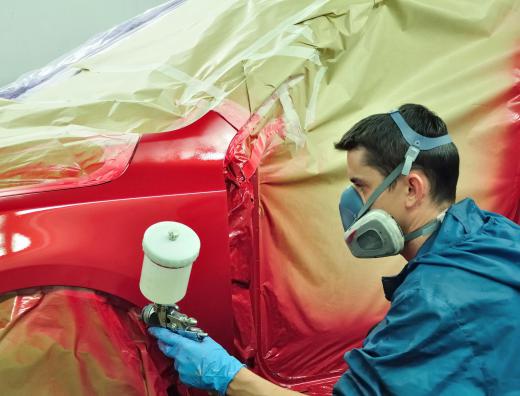An OSHA (Occupational Safety and Health Administration) respirator is any respirator that meets the standards laid out in OSHA regulation 29 CRF part 1910. This regulation covers the selection, use, and maintenance of respirators in the workplace. In order to be approved as an OSHA respirator, the device must be certified by the National Institute for Occupational Safety and Health (NIOSH). It must have been chosen to meet the particular hazards of the workplace and be properly used and maintained.
A respirator is a device worn over the nose and mouth to keep the wearer from inhaling airborne particles that might cause a health risk. There are two basic kinds of respirators. Air purifying respirators (APR) remove contaminants from the air. An example of this type of respirator is the kind used by professional cleaners to prevent them from inhaling mold and dust. An air supplying respirator (ASR) provides clean air from another source like a portable tank.

According to OSHA regulations, when an employee works in an environment where he or she may breathe contaminated air, the employee must be provided with an OSHA respirator. The employer must also write a respiratory protection program and provide employees with training in respirator use. Employees must receive medical screenings to ensure that they are fit to use respirators.
The most basic characteristic of an OSHA respirator is that it is NIOSH approved. NIOSH-approved respirators are classified based on the types of contaminants they protect against. Every NIOSH-approved respirator has an approval number and comes with proper use procedures.
Even if a respirator is approved by NIOSH, it is not an OSHA respirator unless it is used correctly. This means that the respirator must be approved for the specific kind of contaminants found on the job site where it will be used. The wearer must also follow the proper use procedures. The respirator must fit properly and be replaced when it has reached its lifespan.
OSHA was created by the United States Congress in 1970 as a division of the U.S. Department of Labor. Its mission is to ensure that all employees in the United States work under safe and healthful conditions. In order to fulfill this mission, OSHA publishes workplace standards that must be followed by all business in the United States. It also oversees state programs, which administer standards that meet or exceed those set out by OSHA.
